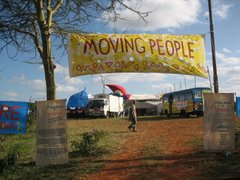From this point on I endeavour to never touch money again. A strong claim I know and one that seems unrealistic at best. And one I am sure I'll be lambasted for if I fail. And probably even get criticised for if I succeed. But why strive for anything other than your ideals in life, why aim for something less than that you believe in. I have compromised too much in my life so far, spending my time fighting against the symptoms of greed, insecurity and fear. From now on I will live my life the way in which I believe life becomes more beautiful. No more compromises. No more battling against symptoms. Now is the time for social homoeopathy.Boyle used to be an entrepreneur with a dot.com business, but for a few years already he has been advocating for an economy without money. The Freeconomy community is about sharing skills and knowledge.
Freeconomy allows people to make the transition from a money based communityless society to more of a community based moneyless society, and to share the land they don't need or can't use to facilitate a local food community. In essence, freeconomy is about making dinner for a friend who was yesterday a stranger (...)
Freeconomy has over 3000 members in 56 countries offering skills, land and knowledge to other members.
Boyle's journey will be documented by the people he meets on the way. He will equip them with the password for this blog and thereby allow them to update it. He is also planning to regularly report from his trek.
I find this project truly amazing, because of its determination, its idealism and its gentleness, however I would like to raise two things I find worth reflecting here:
For one, he might get along without money, but he surely took a passport with him. As it seems unlikely that he is managing to charm the guardians of the diverse nation states he will have to cross into letting him through without identification. And if he tried? What kind of message would that be? Millions of people have to struggle with national borders in their pursuit of happiness; hundreds die every year, because they have to bypass the control of national borders. Surely nation states are as troublesome in our world as the existence of money.
Then, secondly, what do we know about money? Can we really blame the poor state of the world on the existence of abstract forms of exchange? Freeconomy puts it like this:
Birds don't have money, trees don't use money and as far as I know earthworms have never heard of such a ridiculous concept. Money, in any human language today, gets translated to mean security. It's insurance against the universe, nature and the rest of humanity letting us down and not providing for us. No money = No security.His arguement is that the false security of money makes us strive for profit and credit, while real security comes from community, from living with people, sharing and loving each other.
This argument is based on a very modern fallacy. The picture of an ideal community in which people live together authentically is posited against the mediocre alienated state of the affairs we live in. This ideal community is likened to nature, to birds and earthworms, where a perfect harmonic balance exists. This balance of course is the cruel reality of natural live, in which the very human capacity of morality doesn't exist.
The critiques of capitalism often overlook, that - as Max Weber has pointed out - capitalism is not ruthless and without morals, but quite the contrary. Capitalism was founded on moralist arguments against ruthless profit-making and luxury. Moreover it is this quality that made it so successful. Capitalism is based on humans’ wishes to make the world a better place.
It is good to walk out and spread the word of human love and understanding. Boyle's pilgrimage will surely teach him and others a lot. Hopefully however it will also make him reconsider his basic argument: Money is not the issue: The most radical changes in the last 500 years, including the development of the global money based economy were caused by people with good intentions.
